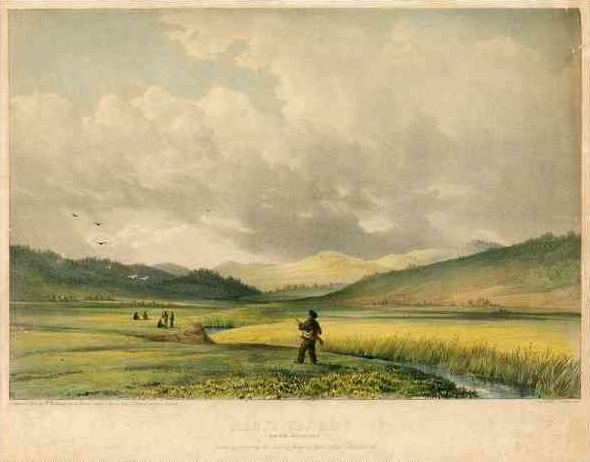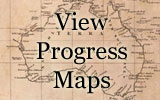In South Australia
After several days of bad weather, Colonel Light is finally able to send the Rapid off to Kangaroo Island on 16 October to fetch supplies and bring over the surveyors from the Cygnet. For the rest of the week he must await its return and he spends the time in completing his surveys of the coast and writing reports. Dr Woodforde remains with him and from him this week we have some detailed reports of the hunting and fishing skills of the Aboriginal men who come to visit the camp. It is not clear whether these are the same men who he earlier called the ‘Encounter Bay tribe,’ or a different group. Woodforde calls them simply the ‘Cape Jervis tribe’, but he is very impressed with them, praising their skill in fishing and their general friendliness. Of course his perception of these men is entirely tempered by the attitudes he has brought with him and the language he uses reflects this. We would find it unacceptable today. On 16 October for example he writes: ‘Contrary to the opinion of most people I think that with kind treatment they may be as easily civilized as any other race of savages’. But at least he is prepared to learn as well as teach. Some days later he writes: ‘I have been engaged with one of the natives this evening learning the language and teaching him in return some words of English’. Nevertheless there is a warning in his earlier words. It seems that others hold different views.

At sea
The Africaine is making excellent progress and Robert Gouger notes that they have travelled some 1221 miles in only six days – the fastest ‘run’ in Captain Duff’s experience. But all is not plain sailing aboard. Mary Thomas clashes with the {tooltip}second mate {end-text} A merchant ship’s officer next in rank below the first mate; also known as a ‘second officer’. {end-tooltip} , whom she finds rude and unhelpful. After a series of confrontations Mary decides that enough is enough, and she writes a long, formal complaint to Captain Duff. We reproduce it here because it helps to show the kinds of silly personal feuds that developed so easily on these long voyages. Captain Duff seems to be a wise and experienced diplomat. He soothes Mary’s wounded pride and apparently finds a way to improve the {tooltip} second mate’s {end-text}A merchant ship’s officer next in rank below the first mate; also known as a ‘second officer’ manners too.{end-tooltip}
These are skills apparently lacking in Captain Hindmarsh, although this week we have no complaints from George Stevenson. Perhaps he is happy for once! Instead we must rely on Young Bingham Hutchinson, whose diligent diary keeping tells us that the Buffalo is making steady progress. By the end of the week it is sailing in fine conditions near the mid-Atlantic Ridge and the young people can once again indulge in some {tooltip} quadrilles {end-text} A dance performed by four couples. It became popular in England after 1813. {end-tooltip} and country dances on the deck.
Language warning: Please note that these sources contain language which is today considered offensive. It has been retained as it is part of the historical record and evidence of past attitudes.

